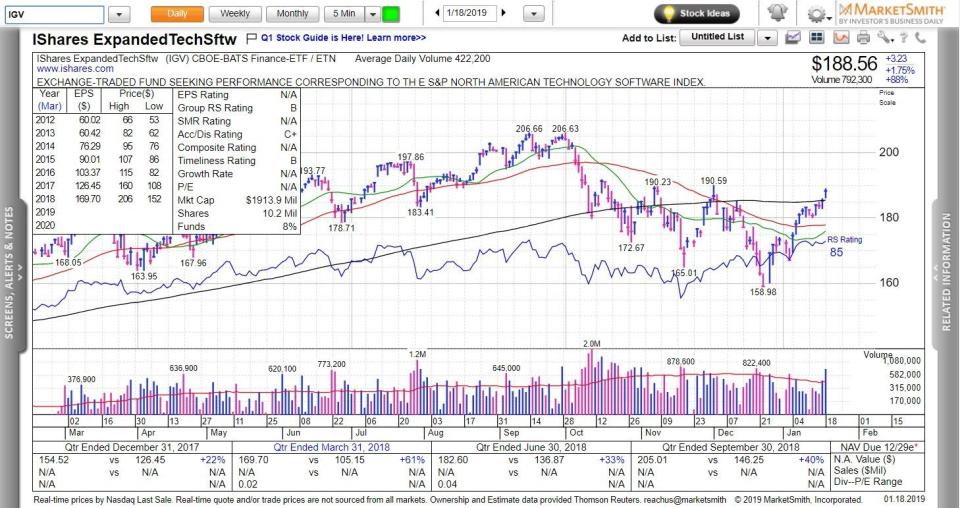Why enterprise software is emerging as one of the market's strongest sectors
One of my favorite concepts to use during market corrections is relative strength. Specifically, I look for stocks showing strength relative to the market. The theory is there are strong growth companies that want to move higher, but the tension of the market is holding them back. Once the selling pressure is relieved, these stocks are usually sitting near highs and have the potential to achieve strong gains.
Relative strength works during shorter-term pullbacks in the market, but it really shines when we see bigger corrections or bear markets. For example, coming out of the 2008-2009 financial crisis, Netflix and Green Mountain Coffee were two of the first growth stocks on the 52-week high list and both went on to experience tremendous gains.
A sector barely affected by the trade war
The reason I bring this up now is that we saw an ugly correction in Q4 of 2018, but the Enterprise Software sector showed great relative strength during that time. It makes sense why the sector is performing well because many companies and government agencies are just starting to move their businesses to the cloud. Due to this ongoing transition, a plethora of software and cloud infrastructure stocks are growing their earnings and sales at 30% or greater year-over-year. In addition, profit margins are expanding for many companies, and this sector is barely affected by the China trade war.
One way to play this group is with the Software ETF (IGV). This gives one broad exposure to one of the leading growth sectors in the market. For those who like individual stocks, I recommend putting in the work to find the companies exhibiting strong technical and fundamental characteristics and that also have large addressable markets.

Another thing that stuck out to me in Q4 of 2018 was the acquisitions in this sector. Specifically, the Vista Equity Partners buyout of Mindbody (MB) at a 68% premium and the DXC Technology (DXC) buyout of Luxoft Holding (LXFT) at an 83% premium. Not only were these deals done at impressive premiums, but they also occurred during a difficult time for the market. This shows me that many private equity firms and larger software companies (i.e. Microsoft, Salesforce.com, IBM, and Oracle) are looking to put money to work when they see declines or find values in smaller software names.
On August 20, 2011, the influential investor and software guru Marc Andreessen wrote an article in the Wall Street Journal with the now-famous title: “Why Software is Eating the World.” In this piece, Andreessen discussed how “we are in the middle of a dramatic and broad technological and economic shift in which software companies are poised to take over large swathes of the economy.” He goes on to say: “Over the next 10 years, I expect many more industries to be disrupted by software.” We have already seen this happen in telecom, video streaming, health care, retail, shipping, job recruiting, and the endless list of industries that are being disrupted by software.
Currently, there is a big debate over whether the stock market is in a bear market rally, or if we already started a new bull market in late December 2018. My view is that it doesn’t matter for software. If this is a new uptrend, you can already see the number of software companies trading at or near new all-time highs, and these stocks should continue to do well over the next 3-5 years. If this is a bear market rally, my guess is these stocks will correct with the market but continue to hold up well and exhibit relative strength. Again, the market is simply the tension holding these stocks back from eating the world.
Read more:
What to expect from the markets in the first quarter of 2019
The market moves because of 2 main factors
I can be reached at: jfahmy@zorcapital.com
Disclaimer: This information is issued solely for informational and educational purposes and does not constitute an offer to sell or a solicitation of an offer to buy securities. None of the information contained on this site constitutes a recommendation that any particular security, portfolio of securities, transaction, or investment strategy is suitable for any specific person. From time to time, the content creator or its affiliates may hold positions or other interests in securities mentioned on this site. The stocks presented are not to be considered a recommendation to buy any stock. This material does not take into account your particular investment objectives. Investors should consult their own financial or investment adviser before trading or acting upon any information provided. Past performance is not indicative of future results.

 Yahoo Finance
Yahoo Finance